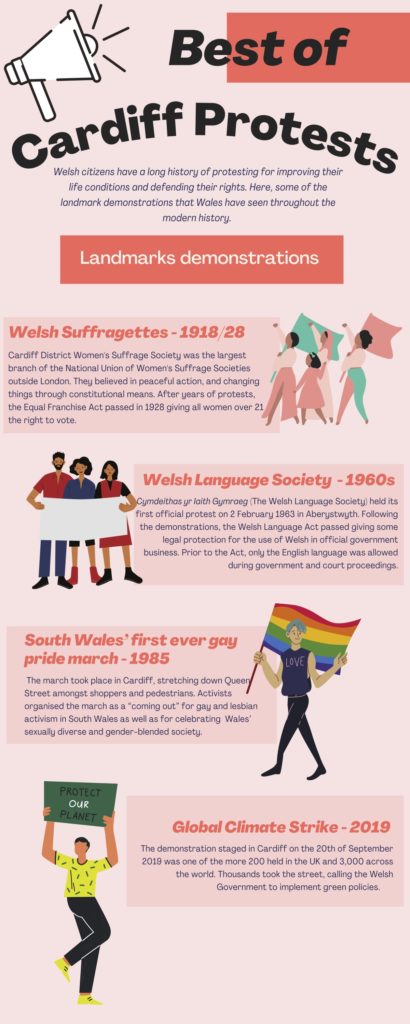While the new controversial Crime Bill has passed its second reading, human rights watchdogs warn it may breach fundamental civil liberties. What’s at stake for Cardiff activism?

It was a cloudy day last Saturday, the end of a long winter of uncertainties. As the clock struck two, a group of people gathered outside Cardiff Bay Police Station; big placards in the air, reading “Kill the Bill” or “We are not going to be silenced.”
As time passed by, the group got bigger. Then, the march started moving. Chants like “People united they’ll never be defeated” were setting the pace. Hundreds marched together, raising their voice in the name of civil liberties, against the protest bill.
“This bill is an attack to us all,” said Bianca Ali from BLM Cardiff & Vale, during an online event.
“It can criminalise protesters for organising demonstrations. It’s a horrible piece of legislation and must be stopped at all costs,” she added.
The events of Saturday, March 20th were the last of a long wave of protests that have been filling the streets of Cardiff for a while now. In January, for the death of Mohamud Hassan. Then at the beginning of March, for the death of Sarah Everard.
Now, the new Police, Crime, Sentencing and Courts Bill is making people angry.
“It’s a seamless smokescreen for turning law abiding citizens into criminals. It is actually removing our right to protest,” said a member of Extinction Rebellion (or XR) Cardiff.
On March 16th, the infamous bill passed the second reading into Parliament with 359 against 263 votes. It is a huge piece of regulation that would bring several changes to the UK crime and policing system. They include:
- Expanding stop and search powers;
- Increasing the police power to crackdown on protests;
- Harsher fines and jail time for unauthorised protesters, Gypsy and Traveller encampments;
- Widening the position of trust laws.
“There are some points in the bill that should be raised, like about cases of child molestation,” said a member of BLM Cardiff & Vale, “but other points, like when it comes to protesting and how the police can even threaten the traveler community, it’s like hidden underneath.”

More than 150 human rights organisations signed a letter, urging the government to reconsider the proposed law that could bring several threats to the right to peaceful protest.
In the UK, there are already some pieces of legislation providing a framework for the policing of protests. The Public Order Act 1986 gives the police some powers for restricting rallies that cause serious disruption to the public order. The Protection from Harassment Act 1997 allows individuals to apply for civil injunctions for preventing harmful demonstrations.
The proposed bill will give the Home Secretary more power to define a protest as serious disruption to the community. This will enable the police to tackle the non-violent but disruptive rallies and bring more control into the hands of the authorities, imposing conditions on demonstrations like time and noise limits.
Protesters could also be charged for “causing public nuisance” with a maximum sentence of 10 years. Demonstrators that damage public memorials could face up to 10 years of jail time.
As a BLM Cardiff & Vale activist said: “If we cannot have the freedom to protest, how does that show we have freedom of speech in this country?”

The bill comes as a reaction to the numerous rallies that have occurred in the past years. Particularly, it aims to find an effective way to tackle civil disobedience actions that are at the core of Extinction Rebellion’s tactics.
“Extinction Rebellion, from the protesting point of view, already breaks the law,” said an XR Cardiff activist. “So bringing more laws to control XR isn’t going to work. They are going to carry on breaking the law because that’s what they’re doing.”
“What they are doing is criminalising all the organisations that don’t break the law. They are the ones who will be criminalised. It’s silencing everybody,” he added.
And from the law benches, concerns are sparking.
As Michael Mansfield QC, barrister and human right campaigner currently representing the family of Mohamud Hassan, said recently at an online event: “They really want to quell opposition and challenge everyone speaking out against policies.”

Protests are the fuel for changing society. They are an important part of our democracy. Several demonstrations across Wales have brought significant improvement to the country and its citizens in the past.
As the sociologist Zeynep Tufekci wrote in an article for The Atlantic, protests are extremely important because they change people’s minds even without the need to participate.
A member of XR Cardiff said: “What we’re doing is highlighting the failings of the government. We’re not doing anything else. We’re not causing a fuss, we’re highlighting the government’s failings. And that is the problem.”
Although the bill was supposed to be discussed at the committee during this week, the next stage seems now to be delayed until summer.
Kill the bill: Bristol protests
If last weekend’s demonstrations have passed in Cardiff without incidents, the protest that occurred Sunday in Bristol ended up with clashes amongst a group of protesters and the police.
Two police vehicles were set on fire, the Bridewell Police Station damaged and some officers injured.
“BLM Cardiff came in solidarity with Bristol because it was a peaceful protest,” said one of its members, “we have regular contact with individuals who did attend the protest saying that it was relatively peaceful until the police came there.”
Unauthorised by officers, Tuesday night a second demonstration occurred. Despite being peaceful, riot police cracked down the rally with force and made 14 arrests.
Even though the news of the violence has filled the covers of every newspaper across the country, few remembered the peaceful march that the majority of Bristolians took part in.
Here, a video that sums up the Sunday events of the Bristol Kill the Bill protest.


